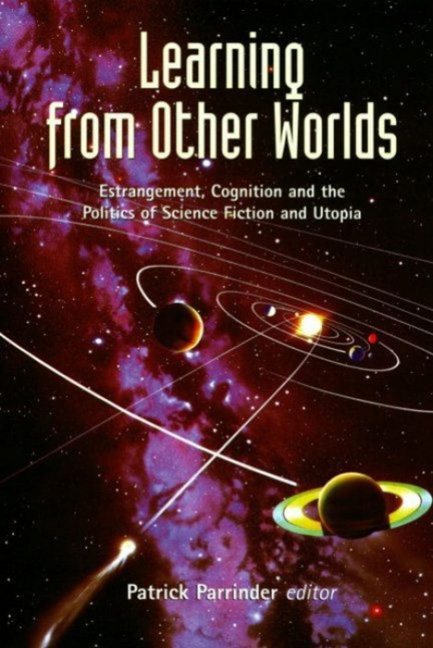Book contents
- Frontmatter
- Contents
- Acknowledgements
- Contributors
- Introduction: Learning from Other Worlds
- Part I Science Fiction and Utopia: Theory and Politics
- Part II Science Fiction in its Social, Cultural and Philosophical Contexts
- From the Images of Science to Science Fiction
- Estranged Invaders: The War of the Worlds
- ‘A part of the … family [?]’: John Wyndham's The Midwich Cuckoos as Estranged Autobiography
- Labyrinth, Double and Mask in the Science Fiction of Stanislaw Lem
- ‘We're at the start of a new ball game and that's why we're all real nervous’: Or, Cloning—Technological Cognition Reflects Estrangement from Women
- ‘If I find one good city I will spare the man’: Realism and Utopia in Kim Stanley Robinson's Mars Trilogy
- Afterword: With Sober, Estranged Eyes
- Darko Suvin: Checklist of Printed Items that Concern Science Fiction (with Utopian Fiction or Utopianism, and a Few Bordering Items)
- Bibliography
- Index
‘If I find one good city I will spare the man’: Realism and Utopia in Kim Stanley Robinson's Mars Trilogy
from Part II - Science Fiction in its Social, Cultural and Philosophical Contexts
- Frontmatter
- Contents
- Acknowledgements
- Contributors
- Introduction: Learning from Other Worlds
- Part I Science Fiction and Utopia: Theory and Politics
- Part II Science Fiction in its Social, Cultural and Philosophical Contexts
- From the Images of Science to Science Fiction
- Estranged Invaders: The War of the Worlds
- ‘A part of the … family [?]’: John Wyndham's The Midwich Cuckoos as Estranged Autobiography
- Labyrinth, Double and Mask in the Science Fiction of Stanislaw Lem
- ‘We're at the start of a new ball game and that's why we're all real nervous’: Or, Cloning—Technological Cognition Reflects Estrangement from Women
- ‘If I find one good city I will spare the man’: Realism and Utopia in Kim Stanley Robinson's Mars Trilogy
- Afterword: With Sober, Estranged Eyes
- Darko Suvin: Checklist of Printed Items that Concern Science Fiction (with Utopian Fiction or Utopianism, and a Few Bordering Items)
- Bibliography
- Index
Summary
Strictly speaking, Utopia is not a genre in its own right, but rather the socio-political sub-genre of Science Fiction.
Darko SuvinFor those who still think that science fiction is about science, the Mars trilogy will certainly qualify. Not only are scientists and engineers among its principal characters; pages upon pages offer pocket disquisitions on a host of topics that surely qualify as hard science, most of it relating to terraforming: such as the biochemistry of rocks and solids; the dynamics of gases and the composition of atmosphere; aquifers and the release of water and other liquids; genetically engineered micro-organisms and genetically reconstructed DNA; radiation, light and heat; the food chain; the structure of topsoil; meteorology and the dynamics of wind and climate; botanical systems and classification; ‘string theory’ and the unified field theory in physics; the mechanics of velocity in astronomical and military situations. Robinson manages to hold the non-scientific reader's interest and attention during these brief but ludic discussions, about which one would also like to hear the scientists’ opinions or to browse through a collection of essays by the experts on his treatment of these specialized matters, which I take to be a mixture of state-of-the-art conceptualization and ‘speculation’, mainstream or otherwise. It is true that the literary critic would here interpose the reminder that the novel offers a mimesis of science and scientific activity and not the thing itself. It is an aestheticist answer, which has always aimed at separating out the literary and ‘imaginative’ from the referential (‘real’ science, ‘real’ scientific texts and so on), but which in the present context has the disadvantage of bracketing the ‘cognitive’ as such. Still even the ‘verisimilitude’ of imitation necessarily has something to do with outside factors, and in particular the rapidly changing configurations of these various scientific fields in the real world.
More pertinent is, I think, the way in which these scientific facts and findings, presuppositions and activities are themselves staged: namely, as data and raw materials for the solving of problems, rather than as abstract and contemplative features of an epistemology or scientific world picture.
- Type
- Chapter
- Information
- Learning from Other WorldsEstrangement, Cognition, and the Politics of Science Fiction and Utopia, pp. 208 - 232Publisher: Liverpool University PressPrint publication year: 2000



